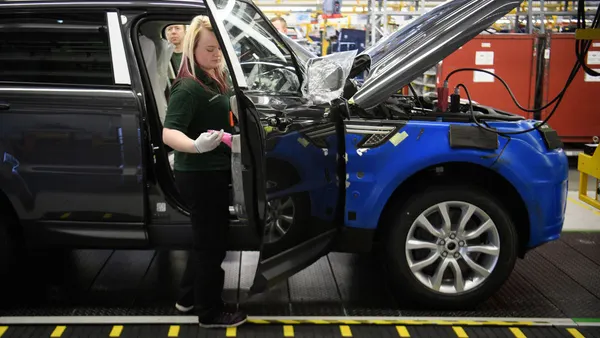Dive Brief:
- The DRIVE-Safe Act under review in the House would allow truck drivers under 21 to transport goods across state lines, but the legislation has divided the trucking industry.
- The Owner-Operator Independent Drivers Association (OOIDA) calls it "irresponsible," saying the best way to address the driver shortage is to focus on better pay and working conditions.
- According to commentary on the legislation from Advanced Training Systems, which trains new truck drivers, "major users of trucking services" — including 3PL coalitions like the International Foodservice Distributors Association — approve of the bill as a way to mitigate the capacity crunch by adding more drivers to the roster.
Dive Insight:
The American Trucking Associations (ATA) says the current shortage of drivers is 51,000 nationwide. According to USA Today, the ATA expects the number to reach almost 100,000 by 2021.
As one possible solution, two legislators, Rep. Duncan Hunter (R-Calif.) and Rep. Trey Hollingsworth (R-Ind.) have proposed DRIVE-Safe (Developing Responsible Individuals for a Vibrant Economy Act), which would replace a federal law that bans drivers younger than 21 from transporting goods outside of the state in which they’re licensed.
"This legislation will help train drivers to a level far and above current licensing standards," said John Kearney, CEO and President of Advanced Training Systems (ATS) in a press release emailed to Supply Chain Dive. "It creates opportunity while reinforcing a culture of safety."
But safety groups and driver organizations insist that safety will be compromised. Advocates for Highway and Auto Safety, for example, says that teenagers need more time to learn to handle the giant long-haul vehicles, especially when they enter urban areas.
Because younger drivers have higher crash rates in general, insurance costs will skyrocket, so younger drivers could be more expensive for the industry, or at least cancel out any gains gotten by adding more drivers to the roster.
Even the OOIDA, which acknowledges the severe driver shortage, opposes the legislation as a band-aid for the "real problem," which it says is poor treatment of drivers.
On the other hand, companies needing their goods shipped and delivered on time are generally in favor of the proposal, especially in light of fines that some large retailers are levying for late arrivals.
Walmart, for example, levels a fine worth 3% of the value of each late or incomplete shipment. The Food Marketing Institute says that grocers lose $75 billion per year in sales — 10% of the industry total — due to out-of-stocks and unsaleable goods.
As currently proposed, the bill would require teenagers to log 400 hours of on-duty driving and 240 hours with an experienced driver in the passenger seat before being licensed to cross state lines.













